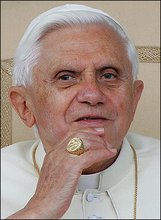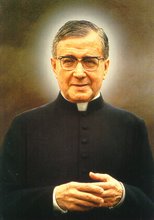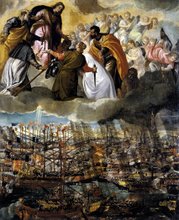
Some random thoughts after Tuesday night - I haven't felt like writing anything up until now. I have been trying to work out, principally through prayer, what is the spiritual meaning of this election, because there is a profoundly spiritual meaning.
1. The fact that Catholics, or sacramentalized pagans, were responsible for the election of the most anti-life candidate this country has ever seen, is of great consequence. It means that Newman's phrase about the "mass apostasy of the faithful" has come true. One blog used the phrase the "repudiation of the Bishops." So the Bishops who taught, like Bishop Finn, that one's soul could be imperiled by this vote, were repudiated. Strangely, I have been very circumspect about this, because it is obvious to me that a great punishment is coming. I am not, by nature, overly apocalyptic, but I'm afraid I completely agree with Michael O'Brien, who is, I think, something of a mystic, that, although Felsenburgh may not be the anti-Christ, he is "one of the key figures who will usher in the great time of trial and the last and worst persecution of the Church."
2. It is also clear that, just like in England during the Penal times and the time of the English Martyrs, we now have accomodationist bishops who will become the equivalent of the "official Churches" in post-war Eastern Europe - and an emerging Church of the Martyrs with, thank God, a John Fisher or two. Also, as one of my priest friends commented to me, he can already identify the people in his parish who will happily betray him to the authorities. Luckily, I think we can also identify the people who will protect us.
3. The role of the media has been truly disgraceful throughout this campaign. The mainstream media will become an even more effective tool in the assault on the Church.
4. Preaching and teaching will have to be fearless - despite the consequences.
5. Prayer and fasting - that should be obvious, but many of us, myself included have done too little of both.
6. Will we be Saul, or will we be Paul?










4 comments:
Father, I continue to believe that among those who voted contrary to the teachings of the bishops were those who were swayed by people who claimed that doing so would reduce abortions. The fact that making something morally wrong legal in order to reduce it is flawed thinking somehow didn't seem to be something that they could wrap their brains around. I also think that in many cases they felt duped by the present administration which has been less than consistent on life issues (stem cell research is allowed, RU486 is allowed, torture is practiced). I don't agree with their choices, but I do understand to a degree how they made them. Some of those people are more than willing to throw themselves into the battle for life. Others fall into a very different category. They believe the Church to be wrong on abortion, to be wrong on contraception,to be wrong on stem cells, to be wrong on assisted fertility methods, to he wrong on end of life issues,to be wrong on gay marriage to be wrong on divorce. They think these things should be up to the individual and the Church should simply shut up about them or else get with the modern agenda. I think it is critically important to draw a distinction between those two groups. If we lump them together we will find ourselves at odds with people who, perhaps with imperfectly formed consciences, voted with the best judgment they could muster, but whom are still wanting desperately to be faithful to the teachings of the Church.
The bishops who spoke out were brave, the ones who remained silent may have felt they were acting like Pius XII behaved at times. Watching the hostile reactions of some Catholics to the bishops who did speak out and even the adolescent rebellious feelings that they seemed to have provoked among some people makes me at least understand better why some bishops were silent. I still wish that more of them had spoken.
There truly are some within the Church who have no particular desire to be faithful at all. The Catholic Church is a cultural heritage to them, but it is also an organization that they think can be manipulated to their own ends. I saw the same thing in mainline Protestantism. There are, however, people who simply see things differently, who think that, for example, taking away the Church's non-profit status might allow her to be freely prophetic in what she says. These people tend to think that the Church's role is less in electing politicians and more in changing hearts. We can disagree with them, but we need to recognize that at the end of the day they truly do want to be loyal sons and daughters of the Church. It's incredibly important to make a distinction between these two groups. One of them would turn you in in a heartbeat, the other would hide you behind a wall and go to their own death to protect you if necessary.
Moments like this can be a good time for finding out who the true believers really are. Those who stomp out and say that the bishops should be silenced had hearts that left long before their bodies. Those who remain will be the ones who'd be willing to follow Margaret Clitheroe, John Fisher, Thomas More, and the rest all the way to the place of execution. Hopefully it won't come to that, but it would be a good thing if cafeteria Catholics either learned that the Church is not a cafeteria line or else went elsewhere. Perhaps going elsewhere would produce a yearning for the Eucharist that they simply don't recognize now and they might return with a more faithful heart. I suspect that the Church won't have to do the weeding out, that those with divided hearts will find being identifiably Catholic a less and less popular thing and will leave on their own.
There is a real value in being weak and unpopular. Those who would attach themselves to the Church because it gives them a certain credibility in places will quickly discover that attachment to a weak and low status Church doesn't do that. Think about how much more faithful the Church in England was when its sons couldn't go to Oxford. Think about how faithful the early Church was when martyrdom was a real possibility. It's painful to think about being weak, poor, despised, yet we have many good models for that.
There were understandable reasons for seeking approval in society at large. I'm sure that bishops and priests saw it as a way of reaching out to people who wouldn't have stepped foot into a more ethnic Church. There weren't many who were willing to take the path of Saint Elizabeth Ann Seton. However, there are times when acceptance by society means rejecting Christ. This may well be one of those times. We may lose bottoms in the pews and even dollars in the plates, but in the end we will see what Christ can do with a Church that cares more about following him than acceptance by the world.
Fight the good fight, Father.
Liz,
You are wrong on so many points I hardly know where to begin. People didn't vote for Obama thinking he would "reduce the number of abortions". They voted out of pure, unadulterated greed and selfishness. They think Obama will give them free stuff: healthcare, money, gas and make their mortgage payments.
And your contention that it is okay to seek the approval of society at large? At the expense of murdered babies? No, it's never right to "seek the approval" of the culture of death.
I go from being stunned to being sickened to being distraught at what has been done in this country.
The punishment I think may be the same for us as it was for Israel: God will give us what we ask for rather than what we need.
Post a Comment